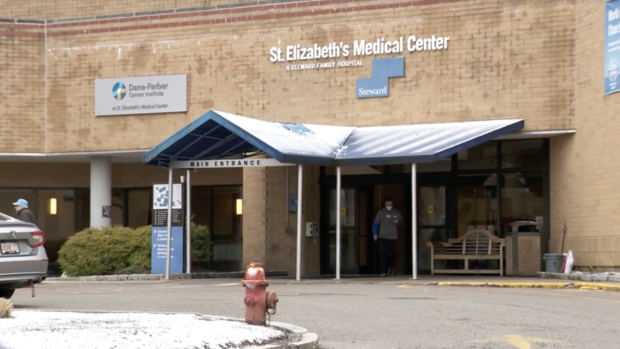
A new mom died after giving birth at a Boston hospital. Was corporate greed to blame?
Nabil Haque said he can still remember the moment his wife Sungida Rashid first held their baby daughter in her arms after giving birth at Boston’s St. Elizabeth’s Medical Center last October.
“It was a beautiful moment,” Haque told CBS News chief medical correspondent Dr. Jon LaPook, in his first television interview. “I wasn’t expecting it to be this blissful.”
The bliss was short-lived. In the hours after delivery, Rashid experienced a cascade of complications at a hospital that was unexpectedly ill-prepared for her urgent need, and was transferred to another hospital, where she died. Her death has triggered a fresh wave of public scrutiny into the mounting patient risks and health care compromises that have surfaced under hospitals owned by private equity-backed companies.
private equity giant Cerberus, Steward started buying up Massachusetts hospitals in 2010 and now owns 33 hospitals across 8 states.
The Dallas-based health care company has been one focus of a year-and-a-half-long CBS News investigation revealing how private equity investors have siphoned hundreds of millions of dollars from community hospitals with devastating public health consequences. Last April, CBS News found Steward redirected money away from hospital operations by selling off the real estate of San Antonio’s Texas Vista Medical Center before closing the facility altogether.
A spokesperson for Steward told CBS News company executives always put patients first and said they “deny that any other considerations were placed ahead of that guiding principle.” In an earlier statement, the spokesperson said Steward “has actively and meaningfully invested” in its hospital system since its formation, including in Massachusetts, where it took over hospitals that were “failing” and “about to close.”
“Steward’s investment has taken the form of facility upgrades, equipment, technology, and other meaningful improvements,” the spokesperson wrote.
Yet records reviewed by CBS News showed Steward hospitals around the country with a trail of unpaid bills, at times risking a shortage of potentially life-saving supplies. That appears to be what happened at St. Elizabeth’s last October, where medical staff says a device that could have stopped the bleeding in Rashid’s liver was repossessed by the manufacturer weeks earlier.
After giving birth, Rashid experienced bleeding from her uterus, followed by pain around the back of her rib cage. Doctors sent her for an emergency CT scan and then rushed her to the emergency room where, Haque said, they found bleeding in her liver. Hours later, Rashid died during surgery at a second hospital, a tragedy first reported by the Boston Globe,
Courtesy of Nabil Haque
Rashid’s death is now the subject of a state investigation. Haque says doctors told him they wanted to use a device called an embolization coil to stop the bleeding from his wife’s liver. He said when St. Elizabeth’s didn’t have the coil, she was transferred to the second hospital.
“An hour later, she had another cardiac arrest,” Haque said. “They couldn’t revive her. It was shocking. I said, ‘Well, what exactly happened?'”
In a complaint filed to Massachusetts’ health department obtained by CBS News, health care workers at St. Elizabeth’s said the manufacturer had come to “retrieve any coils at the hospital” weeks before because Steward hadn’t paid its bills. According to a lawsuit filed last October by the manufacturer, Steward owed about $2.5 million in unpaid bills.
Steward declined to comment on Rashid’s death, citing privacy concerns. The incident has touched off a wave of recriminations in Massachusetts, where Steward owns nine hospitals, including St. Elizabeth’s. Healey called her death “outrageous,” and her administration is looking at whether her death was preventable.
“It underscores what has been happening out here with Steward,” said Healey. ” If you are about cutting corners in furtherance of making money, people are going to get hurt. That’s wrong. That needs to change.”
Concern about hospitals closing
In December, Steward informed health officials in Massachusetts that it would be closing New England Sinai in Stoughton, another of its hospitals in the state. The announcement has set off statewide fears about the company’s financial situation and whether it would be shuttering more hospitals.
“It’s a catastrophic situation in our state,” said emergency room nurse Kathy Reardon, an official with the Massachusetts Nurses Association, a union that represents health care workers at Steward’s hospitals in the state.
Reardon said Steward’s hospitals typically serve low-income communities and patients without a primary care doctor who end up using the emergency room for their health needs.
“If any of these hospitals were to close, it would be an astronomically tragic situation for all the citizens of Massachusetts,” she said.
In February, a Steward executive sent a message informing staff the company had secured financing “to help stabilize” hospital operations, and, in a statement, a company spokesperson told CBS News it has no plans to close any additional hospitals.
Healey said Steward’s failures have prompted her to install monitors — staff from the state’s health department — inside each of Steward’s hospitals to try to ensure patient safety. She said she believes Steward should no longer be operating in Massachusetts. “They’ve taken too much from too many,” Healey said “The sooner Steward is out of our state, the better.”
Financial questions — and a $40 million yacht
In a statement to CBS News, a Steward spokesperson said that the company had invested about $2 billion in the hospitals it has acquired, including propping up the employee pension fund for employees at its Massachusetts hospitals, which was underfunded by hundreds of millions of dollars when Steward acquired them.
The company has blamed its current financial woes on the pandemic and low reimbursement rates from Medicare and Medicaid services.
In a lengthy interview with CBS News, Healey called Steward’s justification “hogwash.” Instead, she accused Steward executives of driving the company deep into debt while enriching themselves — all at the public’s expense.
“The game was, come to Massachusettts, make some investments and then begin to suck out as much as you can in terms of profits,” she said.
Cerberus, the private equity firm, shed its stake in Steward by January 2021, after making an $800 million profit in a decade, according to a report from Bloomberg. Financial records show Steward has also sold off more than $1 billion of its hospitals’ land and buildings since 2016 to Medical Properties Trust, which has made a business of buying up hospital real estate from private equity investors.
Last year, CBS News reported on Prospect Medical, another private equity-backed chain, whose owners sold off the real estate of a group of suburban Pennsylvania hospitals to cover the debt they incurred when they paid themselves hundreds of millions of dollars out of the company’s coffers.
The financial moves, though legal, ultimately spelled doom for the century-old Delaware County Memorial Hospital, which was forced to shut its doors after Pennsylvania’s health department deemed the facility inadequately staffed.
Angela Neopolitano, who worked at Delaware County Memorial for 41 years, says, before the closure, the hospital was dismantled piece by piece, leading to longer waits in the emergency room and forcing staff to transfer more patients to other hospitals.
“They kept on cutting services,” Neopolitano said. “Things wouldn’t get fixed. Our elevator in the back of the emergency room had been broken for over a year. When they closed the ICU, that was the knife in my heart.”
A filing with the Securities and Exchange Commission from 2021 shows Steward’s owners also paid themselves millions in dividends. Around the same time, Steward CEO Ralph de la Torre acquired a 190-foot yacht estimated to be worth $40 million.
superyachtfan
In an email to CBS News, Steward confirmed de la Torre owned the yacht. Reports about the vessel have been particularly galling to health care workers on the front lines of Steward’s hospitals.
Respiratory therapist Jessica Carrasco worked at Texas Vista Medical Center, Steward’s San Antonio hospital, for eight years. She said, before the company shut the hospital down last May, there was a shortage of tubing for respiratory masks.
“Coordinators were having to phone a friend to let us borrow, you know, a cup of sugar,” Carrasco said.
At Steward’s Massachusetts hospitals, CBS News found at least 16 vendors weren’t paid on time, including a dialysis company that provided life-saving services. Reardon said the supply shortages were unlike anything she’s experienced in her 35 years of nursing.
“It’s unacceptable to us,” she said. “They pick and choose who to pay and what supplies to get.”
A family’s loss: “It’s just still surreal”
Sungida Rashid and Nabil Haque had come to Boston earlier in 2023 for Haque’s postdoctoral program. Haque told us his wife’s smile and sense of humor could light up a room.
“The laugh was, you know, contagious, and you could hear it from a different apartment, but that’s something I really liked about her,” Haque said. “It’s just still surreal, she’s not here.”
Haque said he was angry when he first learned from a Globe reporter that the hospital’s embolization coil had been repossessed. Now, he says he is trying to focus on the small milestones in his daughter’s life instead of wondering whether his wife would still be here if the couple didn’t deliver at a Steward hospital.
“I’m looking forward to her starting to walk and eat solid food, and I’m not planning anything about myself,” said Haque, who spoke with CBS News from his parents’ home in Bangladesh. “A lot of my plans are now buried with Sungida.”
More
More
Source: cbsnews.com

